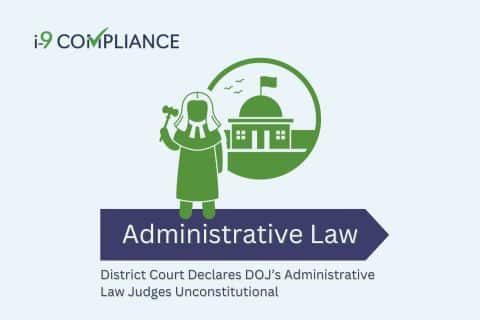District Court Declares DOJ’s Administrative Law Judges Unconstitutional

November 20, 2023
A United States District Court judge has ruled against the U.S. Department of Justice (DOJ). This decision addressed an administrative case that sought penalties for alleged violations of the Immigration and Nationality Act (INA). According to the judge, the Department’s administrative judges lack the authority to oversee the administrative case. The ruling also temporarily blocks the DOJ from continuing its discrimination lawsuit against a space technology company.
The discrimination lawsuit is one filed by the DOJ to the Office of the Chief Administrative Hearing Officer (OCAHO). The DOJ alleged that the space technology company had routinely discriminated against refugees and asylees. This discrimination happened during the hiring process under a misguided interpretation of export control laws, including the International Traffic in Arms Regulations (ITAR) and the Export Administration Regulations (EAR).
These laws bar employers from disclosing information to those who are not “U.S. persons.” However, the definition of “U.S. persons” includes:
- U.S. citizens;
- U.S. nationals;
- Lawful permanent residents;
- Refugees; and
- Asylees
According to the DOJ, the company regularly discouraged asylees and refugees from applying. The company also failed to consider applications from these groups and repeatedly rejected applicants for employment based on citizenship status. Due to the company’s business activities, the employer explained these actions as necessary under export control laws. The company included examples of working with rockets, which qualify as weapons technology restricted under these laws.
The company also filed a lawsuit against the DOJ in response to these allegations. The suit requested the U.S. District Court for the Southern District of Texas to dismiss the DOJ’s case. Furthermore, the company accused the administrative judge who oversaw the matter of being unconstitutionally appointed. As such, the company felt the judge was “unconstitutionally insulated from Presidential authority.” The lawsuit also claimed that the DOJ’s OCAHO hearing denied the company a right to a jury trial held in a federal court.
The U.S. District Judge overseeing this case agreed with these claims. As such, the judge denounced the DOJ’s administrative judges as improperly appointed via a written order. Because federal law did not provide the attorney general the power to review the administrative judge’s review, the District Judge decided the president must appoint them, and the Senate must approve them. This decision has blocked the DOJ’s case against the space technology company. The DOJ must now wait for the outcome of the company’s lawsuit.
As these proceedings show, export control laws can be challenging, even for prominent companies. Many companies even confuse these laws with the employment eligibility verification (Form I-9) process. The confusion happens because Form I-9 requires employees to present similar documentation to the export control laws. One way to avoid the confusion is to use an electronic I-9 management tool. This tool guides employers through the process, ensuring uniform compliance with every form.
Learn more about automating your employment eligibility verification and ensuring compliance with I-9Compliance.